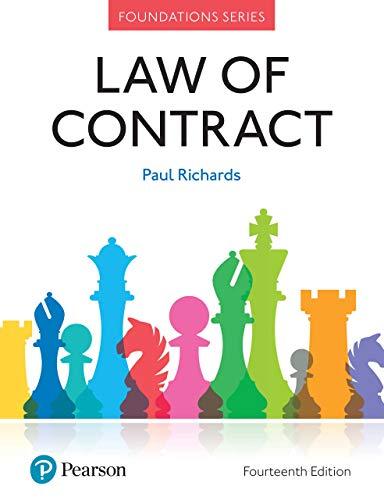Question
In the Marriage of Shaban, the California Court of Appeals was faced with evaluating whether an alleged prenuptial agreement under Islamic law satisfied the Statute
In the Marriage of Shaban, the California Court of Appeals was faced with evaluating whether an "alleged" prenuptial agreement under Islamic law satisfied the Statute of Frauds. In its evaluation of the subject, the California Court of Appeals began its opinion in a dramatic way. It stated in part:
This appeal presents a situation that not only reaches the outer limits of the ability of a prospective married couple to incorporate by reference terms into a prenuptial agreement, but so far exceeds those limits as to fall off the edge. It is one thing for a couple to agree to basic terms, and choose the system of law that they want to govern the construction or interpretation of their premarital agreement. ... (text of Family Code omitted). It is quite another to say, without any agreement as to basic terms, that a marriage will simply be governed by a given system of law and then hope that parol evidence will supply those basic terms.
The facts of the case involve a divorce of a couple that married in Egypt. After 17 years of marriage, they were divorcing, and the issue of dividing the couple's property came into question. It is important to note that the husband was a doctor who had accumulated a significant amount of property during the marriage. The husband claimed that a written prenuptial agreement existed. The document was a one page piece of paper written in Arabic signed by the husband and his father-in-law as the representative for his wife. Since the document was written in Arabic, the court had it translatedthree times. None of the translations indicated any division of the property in the event of a divorce, although the husband did attempt to contend that the document stated that in the event of a divorce, any property would be divided in accordance with Islamic law. The husband hired an expert to testify to this information, but the trial court refused to allow the testimony because it found that the document was really only a marriage certificate and contained nothing that would indicate a division of property. Having established that the document was not a prenuptial agreement, the trial court then divided the couple's property in accordance with California's community property laws. The appeals court affirmed the trial court's ruling finding that the document did not satisfy the Statute of Frauds in California. To satisfy the Statute of Frauds, the writing must state the terms and conditions of the contract and in this case the prenuptial agreement. Stating that a contract of marriage made in accordance with Islamic law is not sufficient to satisfy the Statute of Frauds in that there is no certainty as to the terms and conditions of a property division. Specifically, the court found that
the phrases "in Accordance with his Almighty God's Holy Book and the Rules of his Prophet" and "two parties [having] taken cognizance of the legal implications," no matter how much they might indirectly indicate a desire to be governed by the rules of the Islamic religion, simply bear too attenuated a relationship to any actual terms or conditions of a prenuptial agreement to satisfy the statute of frauds.
Even though the agreement referenced a dowry, it was not sufficiently specific to conclude that constituted an intent to sign a prenuptial agreement.
Questions for Analysis Review In the Marriage of Shaban, specifically focusing on the document in question. Are there additional terms and conditions, if any, that could have been included in the document that have satisfied the Statute of Frauds? Why or why not? What purpose did a dowry have in the case, and what were the reasons behind its concept?
Step by Step Solution
There are 3 Steps involved in it
Step: 1

Get Instant Access to Expert-Tailored Solutions
See step-by-step solutions with expert insights and AI powered tools for academic success
Step: 2

Step: 3

Ace Your Homework with AI
Get the answers you need in no time with our AI-driven, step-by-step assistance
Get Started


